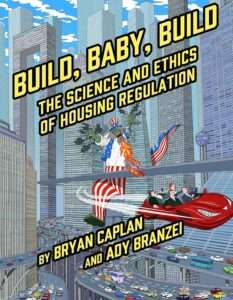Why are housing prices in America so unbelievably high, especially in the country's most desirable locations? The superficial answer is "supply and demand," but the deep answer―the reason supply is so low―is a regulatory system that treats developers like criminals.
In Build, Baby, Build: The Science and Ethics of Housing Regulation, economist Bryan Caplan makes the economic and philosophical case for radical deregulation of this massive market―freeing property owners to build as tall and dense as they wish. Not only would the average price of housing be cut in half, but the building boom unleashed by deregulation would simultaneously reduce inequality, increase social mobility, promote economic growth, reduce homelessness, increase birth rates, help the environment, cut crime, and more.
Combining stunning homage to classic animation with careful interdisciplinary research, Build, Baby, Build takes readers on a grand tour of a bona fide "panacea policy." We can start realizing these missed opportunities as soon as we abandon the widespread misconception that housing regulation solves more problems than it causes.
And here are some early endorsements:
"Bryan Caplan and Ady Branzei have written a fantastically accessible and fantastically fun book explaining why housing is so expensive in the U.S. It is full of insight and sound economic reasoning. I can think of no better book to read for an introduction to understanding why land-use regulations have caused so much damage. It is a perfect book for your 17-year-old daughter or your 70-year-old uncle, for intro econ students or Nobel laureates, and for everyone in between." -- Ed Glaeser, Fred and Eleanor Glimp Professor of Economics and chairman of the Department of Economics, Harvard University
"Bryan Caplan is a pioneer in the use of graphic novels to expound economic concepts. His new book Build, Baby, Build is thus a landmark in economic education, how to present economic ideas, and the integration of economic analysis and graphic visuals. If you want to learn the economics, ethics, and political economy of YIMBY― namely the freedom to build this is the very best place to start." -- Tyler Cowen, Holbert L. Harris Chair of Economics at George Mason University and founder of Marginal Revolution
"The issue of building more is too important to be left for dry monographs. Fortunately, Bryan Caplan is on the case with another in his string of original, brilliant, and important books that is also readable and engaging. After my son read Open Borders, he asked me for recommendations of other graphic novels that were just as educational, insightful, and engaging. I finally have a second book to recommend to him." -- Jason Furman, former chair of the Council of Economic Advisers and Aetna Professor of the Practice of Economic Policy, Harvard University
"Fabulous! Housing deregulation is an issue in which the libertarians have been changing the minds of the liberals (whether or not they admit it), as we see in liberal YIMBYism. This is the book where you can find the arguments advanced, both rigorously and entertainingly." -- Steven Pinker, author of Enlightenment Now: The Case for Reason, Science, Humanism, and Progress
I will add that I have read the book myself, and I think it's a great achievement, even though I'm not normally a fan of the graphic novel format. In that respect, it's a worthy successor to the author's previous book in the same format, Open Borders (which I discussed here).



Show Comments (4)